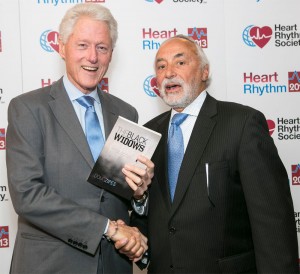June 17th, 2013
Douglas Zipes: Portrait of the Electrophysiologist as a Novelist
Douglas P Zipes, MD, John Ryan, MD and Harlan M. Krumholz, MD, SM
CardioExchange’s John Ryan and Harlan Krumholz interviewed renowned electrophysiologist Douglas Zipes about his alternative career as a novelist. Zipes is the author of two novels, The Black Widows and Ripples in Opperman’s Pond.
Why and when did you decide to write novels?
Zipes: I began 20+ years ago, after reading a medical thriller by a best selling author, and feeling, “I can do a better job than that.” I have always liked writing and am a good story teller. However, I found out writing fiction was a lot harder than it looked, and totally different from scientific writing. My first novel — co-authored with my wife (long story) — is in a drawer, but it was a good beginning. I then took several fiction writing courses and the first result is The Black Widows. Ripples in Opperman’s Pond followed about two years later.
Finally, at this time of my life, another scientific publication, while always rewarding, does not have the “zing” it once did, while entering into an entirely new venue, where they ask, “Zipes? Who the hell is he?” is a challenge like being an intern all over again.
What is your creative process – how do you do the writing?
Zipes: I write like you drive home at night: you know where you start from, where you have to end up, but your headlights illuminate only 100 yards at a time, and you follow them. You could get to the final target by multiple routes. Sometimes you hit a dead end, and have to try a different road. But the exploration is exhilarating.
For The Black Widows, I basically knew the beginning, since it was a theme I had kicked around in my head for many years, and the ending, which took place in Petra, Jordan, which I had just visited as a tourist. I had no idea how to get from point A to point B, but I knew I wanted my hero chasing a bad guy in the old ruins. I learned that, for me, writing in the first person freed my creative spirit, so I became my hero in the novel.
Ripples in Opperman’s Pond was entirely different. It is based on two court trials in which I was the medical expert. The first was defending a prominent physician being sued by the widow of a famous basketball player who had sudden death. The second trial was as a plaintiff expert in which a prominent pharmaceutical company was being sued for not revealing complications of an NSAID. I put both experiences together and created Ripples. I thought the theme of identical twins — nature v. nurture — would also be fun. And finally, I wanted a memorable opening sentence that people would remember, like, “Call me Ishmail” or “It was the best of times, it was the worst of times…” So, the first sentence (spoken by one of the twins) is, “We were identical, Dorian and I, but not at all alike.”

Eugene Braunwald watches while Douglas Zipes gives Israeli president Shimon Peres a copy of his book.
You can always find time for a passion. We love medicine and find time to do all the things we do (ask Harlan!). So, I make time to write. But it’s different than writing an article for Circ/JACC/NEJM in that you can pick it up and work on it for an hour, and then put it down again. I need BLOCKS of time for fiction. I need to get back into the story, become the protagonist, remember whether I said her eyes were blue or brown, etc. It’s a lot harder to re-connect than writing science.
If you were talking to a young Doug Zipes would you tell him to become an electrophysiologist or an author?
Zipes: You’ve got to follow your passion, whatever it is and wherever it takes you. If it’s writing, then do it. Same for medicine. However, you’re more certain of a reasonable lifestyle being a doctor than a writer. Consider: there are about 1 million new titles published annually in the U.S. And there are a lot more writers than doctors waiting on tables in restaurants!


I brew beer, honey mead and sake in my spare time. As a lipidologist (and former biochemist) my professional skills and homebrewing have similar roots.
Doug Zipes wrote a fabulous book. It was an amazing story. Our EP specialists at Hopkins lack the ability to tell a story the way Doug does. Bravo. All members of the cardiovascular community will enjoy this outstanding novel.